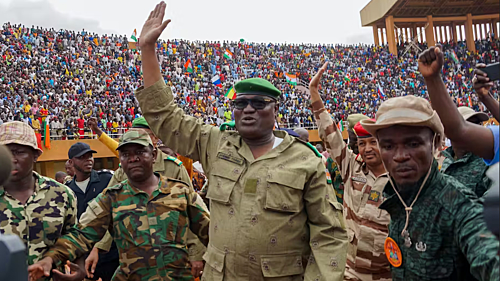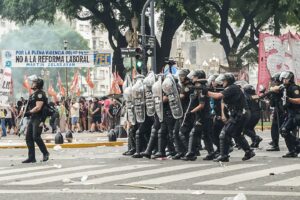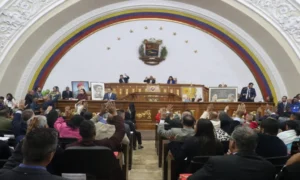
The African Union (AU) declared last Wednesday, August 16th, that it will not support the military intervention that the Economic Community of West African States (ECOWAS) has planned, with the support of France and the USA, to restore the deposed Mohamed Bazoum to the Presidency of Niger. Bazoum was overthrown in a popularly well-received coup on July 26.
Ten days after the deadline given by ECOWAS to Niger’s military government to return Bazoum, the sub-regional bloc is beset by opposition and internal disagreements among its member states.
After the ECOWAS Heads of State ordered on August 10 “the preparation of the ECOWAS Reserve Force” and instructed “the Defense Heads of State to activate it immediately”, there was already a meeting scheduled for August 12 in order to to kick off the action.
However, for “technical reasons”, the meeting was postponed, initially indefinitely. Meanwhile, Cape Verde, a member of ECOWAS, refused to support the military intervention, which its president, José Maria Neves, told AFP would only “aggravate the situation, turning the region into an explosive zone”.
ECOWAS announced on Tuesday that the chiefs of staff of its member states will meet in the Ghanaian capital, Accra, on Thursday and Friday to agree more details on the troop deployment.
Ghanaian MPs oppose sending their troops
Prior to this meeting, an anti-war demonstration was reported on Monday, August 14, in the town of Takoradi, Ghana. Warning Ghanaian President Nana Akufo-Addo against dragging the country into a “geopolitical confrontation by proxy”, opposition lawmakers opposed the deployment of Ghanaian troops as part of the ECOWAS action.
“Military deployment will be the last straw in the ‘stability’ of many West African countries. It could trigger riots and accelerate, rather than contain, the wave of coups d’état that the region has been experiencing,” the Socialist Movement of Ghana (SMG) previously warned.
If Akufo-Addo proceeds with the deployment of Ghanaian troops, the Ghana Union Movement (GUM), Ghana’s third-largest party, “will support a very serious demonstration in the country,” its founder, Christian Kwabena Andrews, warned on Tuesday.
Samuel Okudzeto Ablakwa, an MP for the largest opposition party, the National Democratic Congress (NDC) and a member of the Parliament’s Foreign Affairs Committee, considered “Akufo-Addo’s refusal to submit his policy towards Niger to Parliament” as “very undemocratic”. He added in his statement: “West African leaders who intend to warn Niger about democracy need to be seen by the example they lead at home.”
With the NDC having the same number of seats in parliament as the New Patriotic Party (NPP), Akufo-Addo will have to work hard to secure parliamentary approval for the deployment of Ghanaian troops.
ECOWAS President unable to gain support from his own country’s Senate
Nigeria’s Senate earlier this month declined to support President Bola Tinubu’s plan to send in troops. Nigeria is Africa’s most populous country and the continent’s largest economy, accounting for around 67% of ECOWAS GDP. The country also has the largest army in the bloc.
The August 14 killing of 23 servicemen during a terrorist ambush in the Nigerian state of Niger is another reminder of the pertinence of senators’ warnings that the Nigerian army “is highly ill-equipped and unprepared to fight any war”.
In these circumstances, they argued, “the federal government should focus on resolving the threats of Boko Haram, banditry and the ESN/IPOB…rather than thinking about going to war in a foreign country.”
However, ECOWAS persisted with threats of military intervention in Niger, although Tinubu, the current President, failed to gain support from his own Senate for such an intervention.
Waving Nigerian and Nigerian flags together, the anti-war demonstrators, who took to the streets on Saturday in Kano State, Nigeria, on the border with Niger, developed the following slogan: “Nigerians are our brothers; Nigerians are our family too.” They denounced plans of aggression against their northern neighbor as “a plot by western forces”.
Senegal and Benin committed an unspecified number of troops to the ECOWAS orchestrated invasion. Also joining the fray is Sierra Leone, whose President Julius Bio is facing a crisis of domestic legitimacy after taking power in June this year in a violent election whose credibility of the results is widely disputed by domestic observers, the United States, the United Kingdom, France and the European Union.
Côte d’Ivoire committed to sending 850 to 1100 troops. “This coup d’état is not acceptable,” argues its president Alassane Ouattara, who came to power in 2011 with the help of a US- and French-backed military offensive against the incumbent to whom Ouattara had officially lost a disputed election.
Liberia, along with Gambia – where ECOWAS had already intervened in 2017 – are on the fence, still undecided on whether or not to send troops.
ECOWAS supporters France and US disagree
Making the bloc even worse is the fact that sharp disagreements are also emerging between its main supporters – Niger’s former colonizer France, which has up to 1,500 troops in the country, and the US, with another 1,100 troops in two bases.
Concerned about military action, France opposes the US line of seeking new negotiations and is unwilling to accept anything less than the reinstatement of its ally Bazoum.
Jean-Luc Mélenchon, a former member of France’s National Assembly and leader of France Unbowed, called French support for ECOWAS military action “irresponsible amateurism”. He insisted that “France must not engage in a military expedition against” the AU’s decision to oppose ECOWAS.
Although this fractured coalition against Niger faltered after ordering the “deployment of the ECOWAS Reserve Force”, Niger received strong support from Mali, Burkina Faso and Guinea. All three were suspended and sanctioned by ECOWAS after similar coups with popular support, sustained by anti-French mass movements.
Mali and Burkina Faso, whose popular military governments successfully ordered French troops out, have declared that their military forces will come to Niger’s defense, treating any attack against the country as an attack on themselves as well.
Niger’s military government consolidates domestic support
Meanwhile, Niger’s military government, the National Council for the Safeguarding of the Fatherland (CNSP), which ordered the withdrawal of French troops shortly after the coup against Bazoum, has been consolidating its domestic support.
At the same time that France has refused to withdraw from Niger, arguing that it only recognizes Bazoum’s authority, thousands of Nigerians protested outside their military base in the capital Niamey last week.
On Monday, the CNSP announced that Bazoum would be tried for “High Treason” for inviting foreign powers to invade Niger. The following day, Abdoulaye Seydou, leader of the M62 Movement which was leading the protests demanding the withdrawal of French and foreign troops from the country, was released from prison.
The Bazoum regime, which was cracking down on the anti-French movement, arrested Seydou in January in what Frontline Defenders called an “arbitrary detention… directly linked to his peaceful and legitimate work in defense of human rights.”
Since the coup against Bazoum, tens of thousands have participated in demonstrations and protests in support of the CNSP, against France and against Bazoum, whom they perceive as the puppet of the former colonizer country.
The statement released by the International Assembly of Peoples (IPA) calling for the “immediate removal of foreign military bases from Niger and other African countries” was signed by organizations across the region, such as the Communist Party of Benin, Nigerian Union of Health Professionals Allies, Socialist Movement of Ghana, Revolutionary Communist Party of Côte d’Ivoire, African Party for the Independence of Guinea and Cape Verde, Free Confederation of Workers of Mauritania, Workers’ Democratic Way, Collective of Saharawi Human Rights Defenders in Western Sahara, Party Communist of Jordan, Union of Iraqi Trade Unions, People’s Socialist Coalition Party, Federation of Workers’ Councils and Unions, Tunisian Workers’ Party, Palestinian People’s Party and We Can Movement (Mauritania).
Source: www.brasildefato.com.br

